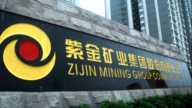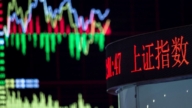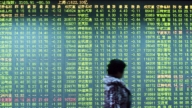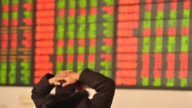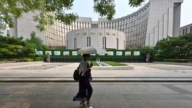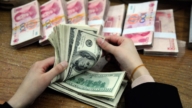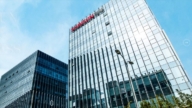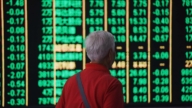【新唐人2014年02月04日讯】英国《经济学人》周刊报导说,在过去三十年,跨国公司涌入中国,在全球金融危机之后,许多公司垂涎三尺的把目光投向神州。但是现在看起来,淘金热已经过去了,中国经济增长变得疲弱,而成本在上升,并且,中共政府限制了外国企业的市场准入等。
《经济学人》1月25号报导说,一些外国公司正在离开中国。美国化妆品公司“露华浓(Revlon)”去年12月说,它正在完全撤离中国。而世界上最大的化妆品公司法国巴黎的“欧莱雅(L’Oreal)”,很快跟进表示,将停止在中国销售它的一个主要品牌“卡尼尔”。另外,美国电子零售商“百思买(Best Buy)”和德国的竞争者“万得城(Media Markt)”,都已经离开中国。互联网巨头“雅虎”也已经离开。
北京天则经济研究所所长助理段绍译:“投资热确实已经在不断的过去,但是也不意味着已经完全过去了。主要中国的经济是从一种短缺经济向过剩经济过渡,所以外资在中国已经就慢慢的缺乏了足够的竞争力。另外中国现在也不需要这么多的外资。其实资本是独立的,资本和市场之间,他是一种相互的双向选择。”
《经济学人》的报导说,外国企业的竞争在加剧。中国已经是世界上最激烈的全球品牌战场,但是质量长期落后的本土企业也加入战斗。许多企业现在有了海外经验,一些企业在开发创新性产品。中国消费者不再只是因为外国品牌就支付高昂的价格。他们对互联网的精通和缺乏品牌忠诚度,让他们成为世界上最挑剔的顾客。
段绍译:“当年中国是一种由计划经济向市场经济过渡,是一种各种商品严重短缺的时代,现在随着这么多年的经济发展,很多的产品都已经过剩了。当短缺的时候,投资就容易得到高回报。而过剩的时候,就要有更多的创新,更大的优势,才能有更多的利润。”
但是外资公司退出中国的原因不尽相同。段绍译举例“雅虎”的退出,与中共政府施压有关。“百思买”,则是因为竞争力无法抗衡国内新兴企业,不得不退出中国。
报导说,中共政府一直让某些行业的外国公司日子难过。它限制外国银行和经纪公司的市场准入,并屏蔽互联网公司,包括“脸书”和“推特”。
中共严厉对待外国公司的情况似乎在蔓延。比如,网路设备厂商“思科”、“IBM”和“高通”正面临“斯诺登事件”后的反弹﹔制药商“葛兰素史克”陷入腐败调查﹔电脑制造商“苹果”因为提供担保不足,去年被迫进行羞辱性的道歉﹔而跨国咖啡连锁店“星巴克”,被官方媒体指控价格欺诈。另外,政府打击官员奢华的运动,也冲击着兜售奢侈品的外国公司。
段绍译:“中国政府官员都是不懂经济的。总是想用非市场的手段来干预价格。这是错误的。但是中国政府官员对于中国本国的企业,在这方面干预是更多的。所以不代表对它(外国企业)产生了恶化,只是说,它们的超国民待遇被减少。”
而一些留下来的外国公司在中国苦苦挣扎。“IBM”说,去年最后一个季度在中国的盈利下跌23%。法国饮料集团“人头马君度(Remy Cointreau)”报告说,去年的前三个季度,“人头马干邑”的销售下降超过30%。还有,美国快餐公司“百胜餐饮集团”,去年9月份在中国的同店销售额下降16%。它的问题,部分是因为中共政府调查它的鸡肉供应商,涉嫌违规使用抗生素。
而投资者也不再热烈拥抱在中国大笔投资的公司。《经济学人》以世界对中国经济的依赖,建构了所谓的“中国依赖指数(Sinodependency Index)”,从中衡量美国跨国公司的中国营收,结果显示,依赖中国的公司与同行比较,在过去两年,他们的股价已经落后于同行。
报导还说,中国仍然是一个富矿。那些可以提高生产力,改善管理和回应本土口味的公司仍然可以蓬勃发展。但是中国的“黄金时代”已经结束了。
采访编辑/秦雪 后制/王明宇
China Gold Rush Fading: Foreign Companies Leaving.
UK’s The Economist magazine has reported that during the past three decades, many multinational companies coveted China, following the global financial crisis.
It now seems the gold rush is over.
This is suggested to because China’s economic growth has become weak and tired with rising production costs.In addition, there have been further restrictions
on market accessibility for foreign companies.
On January 25, The Economist reported that some foreign companies are now leaving China. Last December, U.S. cosmetics company Revlon said that they were completely evacuating China.L’Oreal, one of the world’s largest cosmetics
company from Paris, soon followed this trend, halting sales of its major brand Garnier.
U.S. electronics retailer Best Buy and it’s German competitor Media Markt have left China, as has internet giant Yahoo.
Duan Shaoyi, Assistant Director, Beijing Unirule Institute of Economics: “The fading investment boom doesn’t mean it is completely gone.The transition from a shortage economy to a surplus economy in China made foreign investment lack sufficient competition. Additionally, China does not need so much foreign investment now. In fact, capital is independent, and it is a mutual two-way choice between the capital and the market."
The Economist reported that there is increasing competition for foreign companies. China is already one of the world’s most intensive battlegrounds for global brands. Even local businesses with long term low quality brands have joined the fight. Many companies now have overseas experience and have developed some innovative products. Chinese consumers are no longer simply paying high prices just because a brand is foreign.Their mastery of the internet, and lack of brand loyalty, makes them one of the world’s most fussy customers.
Duan Shaoyi: “Previously, it was a transition from a planned economy to a market based economy. This was associated with a severe shortage of various commodities.Now, a lot of products are in excess, with many years of economic development.Investment may get high return in a shorter time.With longer time periods, more profit requires more innovation and greater consumer advantages."
However, there have been a varied number of reasons for foreign companies leaving China.Duan Shaoyi gave the example that Yahoo quitting was because of pressure from the Chinese regime.Best Buy has left because its cannot compete
against emerging domestic enterprises.
The report said that the Chinese regime has always given some foreign companies a hard time.It restricts market accessibility for foreign banks and brokerage firms. It also blocks internet companies, including Facebook and Twitter.
Information suggests that the Chinese regimes harsh treatment of foreign companies is spreading. For example, Cisco, IBM and QCOM are facing a backlash after the Edward Snowden incident.Pharmaceutical firm GlaxoSmithKline is now under investigation for corruption in China.Apple faced embarrassment after it was forced to make an apology because of insufficient guarantees last year.
Starbucks is under accusation of price cheating by the official state-media.
In addition, the campaign to crackdown on corruption has also impacted foreign luxury goods companies.
Duan Shaoyi: “Chinese officials don’t understand the economy.
This is because they want to use a non-market solution to intervene on prices.
Local Chinese officials have more interventions in local enterprises
So, it just means their super-national treatment is reduced not deteriorated."
Some remaining foreign companies are struggling in China.IBM has said that its last quarter profit fell by 23% in China.French Remy Cointreau reported it ‘s sales of Remy Martin Cognac fell by more than 30% during the first three quarters of last year.
Also, the sales of U.S. Yum in China fell 16% last September.
This is thought to be partly because the regime suspected illegal use of antibiotics. It subsequently investigated its chicken suppliers.
Investors are no longer warmly embraced in China.
The Economist constructed a China reliability index (Sinodependency Index).
This is based according to the world’s dependence on China’s economy, to measure U.S. multinationals ‘ revenue.It showed that those companies relying on China had their stock lag behind their peers during the past two years.
The report also said that China is still a bonanza for those companies that can increase productivity, improve management, and respond to local tastes.
However, China’s ‘Golden Age’ has ended.
Interview & Edit/QinXue Post-Production/Wang Mingyu


